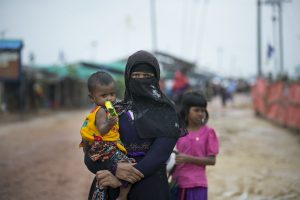Myanmar’s upcoming national election will fail to meet international standards due to the disenfranchisement of hundreds of thousands of Rohingya Muslims, a United Nations human rights investigator said this week.
Addressing the U.N. Human Rights Council in Geneva on September 22, Thomas Andrews argued that the November 8 election could not be considered free and fair as long as the besieged Rohingya minority was prevented from participating.
“The results of an election cannot accurately reflect the will of the people, when the right to vote is denied because of a person’s race, ethnicity or religion,” Andrews said. “And, I have seen no evidence that the government is willing or prepared to facilitate the right to vote for hundreds of thousands of voting age Rohingya located in Rakhine state or in refugee camps in Bangladesh.”
In August 2017, Myanmar’s army responded to scattered attacks by Rohingya militants by razing villages, shooting civilians, and driving more than 700,000 desperate people from northern Rakhine state into Bangladesh. A U.N. fact-finding mission later concluded that senior military commanders should be investigated for crimes including genocide.
Since then, around a million Rohingya have languished in refugee camps in Bangladesh. Several hundred thousand more remain in villages and camps in Rakhine state, but face severe restrictions on their movement.
Campaigning for Myanmar’s election began on September 8, and the polls are widely expected to see a repeat victory for Aung San Suu Kyi’s National League for Democracy (NLD), which won in a landslide in 2015.
Shortly before the beginning of the campaign, 14 Rohingya-led refugee organizations in Bangladesh published an open letter to Myanmar’s Union Election Commission (UEC), urging it to “uphold the right of Rohingya refugees to vote and participate in the 2020 general election.”
Myanmar authorities have also under fire for blocking the candidacies of Rohingya politicians. At least a dozen Rohingya applied to run as candidates in the election, but six were rejected last month after officials said they failed to fulfill byzantine electoral rules. Specifically, they were required to prove that both of their parents were citizens at the time of their birth. Even then, some claim their candidacies were rejected.
One of these was Abu Tahay, a Rohingya running as an independent in Buthidaung township, in northern Rakhine state. “My parents and grandparents were citizens,” Abu Tahay told the human rights watchdog Fortify Rights. “[The authorities] rejected me not according to the law. They are treating us in a discriminatory way.”
In general, the current government refuses to acknowledge the Rohingya as an indigenous ethnic group, regarding them as illegal Bengali immigrants from Bangladesh, even though many claim to have lived in Myanmar for generations. Monywa Aung Shin, a senior official from the ruling NLD, told Reuters last month that the rejection of Rohingya candidates had taken place in conformity with the law. “Whether Bengali or not, foreigners and non-ethnic people are not allowed to run in the election,” he said.
Even then, despite being barred from Myanmar citizenship by a succession of regimes, many Rohingya were able to vote in past elections through the use of temporary identification documents known as “white cards.” But in February 2015, nine months ahead of that year’s election, then-President Thein Sein revoked around 750,000 white cards, most of them held by Rohingya. Amid a broader surge in sectarian hostility toward Myanmar’s Muslims, subsequent legislation and court rulings explicitly robbed former white card holders of voting rights.
Despite the pleas of Rohingya advocacy groups and international observers, the country’s Union Election Commission has shown no intention of restoring suffrage to the Rohingya of Bangladesh and Rakhine state — a population that is unwanted by Myanmar’s government, and increasingly forsaken by the world.

































